“Be the change that you wish to see in the world.” ― Mahatma Gandhi
Happy Holidays and Happy New Year!
What better way to finish the year than with a post on action? Let us begin!
Action…
Why do we have such a problem with taking action? Often, you may have the best intentions and aspirations for your plans.
You may also feel excited to begin and inspired to move forward.
You may be reading blogs and ideas and books that fill you up with brand new ideas. You are ready and make the resolution to take action and bring about massive changes.
Have you had a scenario where you get very excited to take action but you achieve little consistent action? If you are like me, you may have faced a scenario like this before.
You want to take massive action but you might have not chanced upon the structures and habits that allow you to do so.
You desire action but the gravity of fear and doubt is too great to move forward.
You begin great but have to decelerate because your momentum is not sustainable.
What are some ideas to achieve consistent action?
“Action may not always bring happiness, but there is no happiness without action. ” ― William James
Idea 1: Taking On Too Much At One Time
“When asked about what they regret most in the last six months, people tend to identify actions that didn’t meet expectations. But when asked about what they regret most when they look back on their lives as a whole, people tend to identify failures to act.” ― Barry Schwartz, The Paradox of Choice: Why More Is Less
One of the main reasons why you get pulled in too many different directions is because you are taking on too much. This is quite tempting to do but often unproductive.
I think that one of the main reasons that I feel overwhelmed is because of fragmented attention. This is one of the major reasons why I do not have the motivation to take action.
Research has shown the limited nature of human resources such as attention and will. These resources can run out and need to be replenished.
When you take on more that what you can accomplish, you feel a lack of energy and direction.
The simple solution to this dilemma: Begin with one task and get it completed before you go to the next. Take one small action in the here and now and on one task that is bothering you.
Research by behavior researcher Barry Schwartz has shown that excess choice does not empower. In fact having too many things to do and choices to move forward can be paralyzing and limiting.
Having too many choices is a paradox and multiple choices can act to confuse instead of empowering your forward motion.
Idea 2: Consuming Too Much, Implementing Little
“The only thing I fear more than change is no change. The business of being static makes me nuts.” -Twyla Tharp
It is vital for the creative process to have the consumptive and the incubative stages. These are the stages where you allow the influx of new ideas and their colliding and combining in your mind.
Called scratching by Twyla Tharp, creative consumption is essential to creativity.
Silence is also essential to organize ideas and to be consistently creative. See a recent TED talk by Pico Iyer below.
The real problem comes when our incubation and consumption stages become indefinite and habitual. Consuming ideas is great but ask yourself what are you doing with the ideas.
What action are you taking on that next great idea? When the creative impulse strikes you, do you rationalize it away or do you allow it to bear expression?
Does your consumption of ideas and concepts have a meaningful framework of expression as habitual action?
Idea 3: Figure Out Your Action Blueprint
“It’s the action, not the fruit of the action, that’s important. You have to do the right thing. It may not be in your power, may not be in your time, that there’ll be any fruit. But that doesn’t mean you stop doing the right thing. You may never know what results come from your action. But if you do nothing, there will be no result.” ― Mahatma Gandhi
Once you realize where you stand with action vs. consumption, it is time to take a hard look at your action blueprint.
Ask the following questions:
- Where are you most likely to take action?
- Under what environments and situations do you act?
- When do you take most effective action?
- Do you have the tools to take action?
- Do you have sufficient internal and external motivators to take action?
Idea 4: What Are The Usual Suspects That Apply Brakes On Your Forward Momentum?
“An ant on the move does more than a dozing ox.” – Lao Tzu
What prevents you to take action on your projects and your most cherished wishes and ideas?
There are many reasons that cause inertia to our action:
- Fear of success.
- Fear of failure.
- Nagging and systemic doubt.
- Lack of self-belief and self-efficacy.
- Depressive worldview.
- Hopeless thinking.
- Excess negativity.
- Unproductive fatalism such as “who cares” or “how does it matter?”
- Rationalization that it will not work.
- Unable to see the benefits and ramifications of the action.
- Anxiety and excess worry: catastrophe thinking.
Everyone is unique with their set of brakes or inertia causing mechanisms. To determine what prevents you to take action, take notes on your dominant states.
Ask what has prevented you to take consistent action on your goal and how you can move forward?
Awareness is the first step to moving forward with action. When we dismantle each inertia causer one step at a time, we are edging closer to taking action more consistently.
Remember that this is a co-operative effort. The myth is that one thing may cause your inertia. Often, in reality there are several things that prevent your forward motion. How do they feed off each other?
Consider these:
False beliefs+ Fear+ anxiety
Doubt+ worry + negative thinking
Lack of motivation +Lack of engagement + hopeless thinking
Idea 5: Out Of Sight, Out Of Mind: Bring Back Into The Awareness
“Action seems to follow feeling, but really action and feeling go together; and by regulating the action, which is under the more direct control of the will, we can indirectly regulate the feeling, which is not.” ― William James
One of the major reasons that I do not take action on something that I want to do everyday is because it is away from the line of my awareness and sight.
This may sound like an overly simplistic description of why you are hesitating to take action. But sometimes, out of sight and out of awareness is out of mind.
The fewer the steps and obstacles that you face to take action on something, the more likely you are to take it.
So if you want to do exercise everyday, have your clothes and shoes ready to go the previous night.
If you want to floss everyday, have your flosser in sight where you cannot miss it.
The reverse is also true. Since we all have devices everywhere there days, it only takes a second to get distracted also.
So, it works both ways. Sometimes, you may just have to put all distractions away so that they are not easily reachable when you are taking action.
Reminding yourself that you have to take action is the most important first step that you can take.
Idea 6: Setting Up Structures And Habits That Matter
“Those who wish to sing, always find a song.”– Swedish Proverb
Action is a muscle. The more you flex it, the better you get at it. The more you delay action and put it off, the more likely you are to put it off. There are several ways to make action a habit.
Consider a few of these:
- What do your habits and structures look like?
- Do you habitually take action or do you put things off for a favorable time?
- The now is a great time to finish something small.
- For bigger actions, split them up into a few parts and schedule in each part.
- Set up recurring actions in an app or your calendar.
- Use one app or calendar…using more than one does not usually help much.
- Chunk together similar categories of actions that you can do together.
Idea 7: Your Time, How Do You Use It?
“The smallest act of kindness is worth more than the greatest intention.” ― Khalil Gibran
What do you do with the time that you have? We all have the same time and the same hours and months to take action and move forward.
Some ideas are worth mentioning about time. The more stress and tension that you have about time, the less favorable it will appear. Instead, allow time to work towards your action goals.
How can we have time work in our favor?
- Schedule in lots of down time.
- Schedule in good amounts of sleep and rest.
- Make some time for breaks so that you are not ending up taking one when you have to take action.
- Make taking action fun by creating challenges that you can aspire to.
- Tie deadlines and time limits to achievements, intrinsic motivators and external rewards instead of stress and worry.
- Decouple deadlines with stress.
Ask what are you doing in your spare time? Do you have an action plan for forward motion?
Is most of your time spent dealing with crises or are you doing things in a timely fashion?
Time expands and shrinks based on the fun and excitement that we feel towards taking action. Now, you may not always feel excitement to take action.
But, you may be able to find some aspect of the project that you find favorable and enjoyable.
Idea 8: The Pareto Principle In Action
“Do the hard jobs first. The easy jobs will take care of themselves.” ― Dale Carnegie
Another idea closely related to time is the idea of weight or importance of output. The idea that 80% of our output comes from 20% of our work is the Pareto principle.
Even if you do not agree completely with it, a lot of our action and productivity happens under a certain set of conditions.
Your action should identify the areas that you are most actionable and enhance those. Why keep resisting things that are not productive. If possible, delegating them to others who might enjoy them more is a better action idea.
Idea 9: Psychology Of Action: Social Proof
“You will either step forward into growth or you will step back into safety.” -Abraham Maslow
There are several mechanisms of taking action. One of the interesting ones is the effect of social proof. What this means is that we are more likely to take action and follow behaviors demonstrated to be as true in a social context.
Social proof can have negative effects too. But, I believe that remembering others have done the actions or results that you seek is helpful.
Even if you do not find someone in your precise situation, you will not have to look hard to see people who do not hesitate to take the correct action when necessary.
Instead of comparing, it is better to use social proof to believe that you can take actions to be successful in your life.
Beyond social proof, forming mastermind groups and accountability tracking also helps. When you are accountable to someone else or to your close-knit group, you are likely to keep taking action and not quit.
In many developing countries, micro loans given to villagers who knew each other made the returning of that loan secure.
In the Grameen Bank system of the country Bangladesh, a model of accountability is based on the trust of the group and its members. Knowing that returning micro loans will benefit others in the community is a good motivator.
This makes the loan receivers likely to work harder and take action to return the loan.
Idea 10: The Ikea Effect: The DIY connection
“You miss 100% of the shots you don’t take.”– Wayne Gretzki
Research from social psychologist, Dan Ariely, shows when we are more likely to take action on a project. If the final product is something that we can see, we are more motivated to act in the future.
Whether it be a DIY furniture piece, hence the name IKEA effect or bionicle figures from Lego, we are motivated to take future action if our work is highlighted and valued.
In the 50’s and 60’s, instant cake mixes were completely instant. They had no component of DIY or build or make yourself to them.
They did not become a success because housewives in these days wanted to have the pleasure of making something by themselves.
The companies soon figured out that leaving a few components out like oil and eggs out was more beneficial.
This allowed the customers to have a part in the component adding and baking process by adding a few ingredients and mixing. The instant mixes soon became a big success.
The same is true of taking action on a regular basis. Make sure that you have some incentive to take action and the finished product is something that you can look at to stay motivated.
If you get no credit and if your final product gets dismantled, you may not feel the motivation to take consistent action.
“Be content to act, and leave the talking to others.” – Baltasar Gracian
Idea 11: Learned Helplessness
“Inaction breeds doubt and fear. Action breeds confidence and courage. If you want to conquer fear, do not sit home and think about it. Go out and get busy.”- Dale Carnegie
What is learned helplessness?
It is the conditioning and the psychological state that we get that borders on powerlessness and helplessness to effect change.
This may happen when you experience events that seem beyond your realm of control and expertise.
This kind of an experience may feel unpleasant and you may wish to avoid similar situations in the future.
Current and later events of powerlessness to effect change and action may prime you to believing that this is something that you have little power and influence over.
Do you explore options to break free from the limitations exerted by learned helplessness? Usually No, and instead you may choose to accept false limitations and not seek other ways to take action.
We have all gone through much negative conditioning in the past. I believe that it is not a question of if but when we will experience some learned helplessness in our life.
“Don’t use your past as an excuse, excuse your excuses and take action now!” ― Bernard Kelvin Clive
In my life and my experience, the process works like this:
1. An event or a series of events or a stimulus happens that seems out of control. You feel like you have no say in the matter and do not have much influence. You may feel disempowered to make changes and take action.
2. You may fail at the event and repeated failures may accumulate. You warm up to the idea that you are not good at drawing pictures and being creative. I am using drawing as an example here.
Your failure feels uncontrollable and no matter what you do, it makes no perceptible difference.
A good example is a consistently failing salesperson. No matter what they do, sales do not seem to improve and they do not have the extra something to be successful.
3. The outcome may be unfavorable enough to make you feel like that particular field is something that you are and not good at.
You assume the persona of a pessimistic person. Your outlook may get overwhelmingly negative. This negativity feeds into the helplessness.
4. You may even feel incompetent and your performance may decline in later events.
5. You may experience distress, avoidance and emotional withdrawal. You feel unmotivated and experience a lack of enthusiasm when you think or confront the same problem in the future.
6. You make excuses when confronted with that situation. You justify your position that anything that you do will not be enough to being about meaningful action and change.
7. You stop taking action or you do not attempt to take any action at all.
Idea 12: Why Perfectionism Is Action Enemy #1
“Action is the antidote to despair.”- Joan Baez
As the famous quote goes, do not allow the perfect be the enemy of the good. But this is what many of us do on a regular basis.
If you asked me to zero in to the single most significant reason why people do not take action, I would have to go with perfectionism.
The problem with perfectionism is that it seldom acts by itself. It is not simply a quest to do a better job that keeps us locked in place in the realm of inaction. Perfectionism masks itself with things that stop action such as:
- Low self-esteem and self worth.
- Guilt of looking bad.
- Shame that you are not producing the best.
- Not feeling like you are good enough.
- Conditioning that forces you to keep making things better.
- Criticism and blame that you expect facing.
- The inner voice of reason and rationalization.
- Fear of failure.
There are several false beliefs at the root of perfectionism that prevent you from taking action.
The main false belief is that your work needs to be great or never published at all. This is all or nothing thinking and it is quite impossible to do your best work every single time.
Productive people take action regardless of perfectionism and then make corrections or improvise afterwards.
They give themselves the permission to keep producing work. Often this work might be mediocre but that does not stop them from producing.
George Schultz, the creator of the Peanuts comic strip produced a new strip every single day for 50 years. Yes, that is not a editing mistake on my part. Let us read that again!
It is not unreasonable to assume that not all those cartoon strips are great. This is an example of the opposite of being perfectionistic and waiting to make the best work.
Idea 13: Too Many Chefs Spoil The Broth
“The secret of getting ahead is getting started.” – Sally Berger
Many people like to work by committee because they do not trust their own idea and opinion to make a decision and move forward.
When they ask and take counsel in many different people, they do not get the reactions that they expect. This often leaves them in doubt and analysis.
This is a safe region for many people because they do not have to make a decision and move forward with action because their committee has expressed doubt.
While it is never a bad idea to get feedback from other people, moving forward through committee may not always work for you.
There is a reason why the main action teams of many successful companies consist of well defined hierarchies of people. These action teams are small and often quite effective.
Take for example the design group of Johnny Ive at Apple. They are a tight knit design team with a clear hierarchy and leadership. Even the legendary Steve Jobs believed in the efficacy and action power of the small and tight knit group.
So the next time, you try to take action by committee, remember that too many chefs can indeed spoil the broth.
If action by committee is not serving you, split up into smaller and more effective units. Do not hesitate to take action by yourself in your life.
If you have to run every decision and action that you take through someone else, ask why do you always desire the safety net.
Do you trust yourself or do you have to get the opinion of others before you can act.
Are you afraid of backlash or fear or are you afraid that you will be to blame for the decision? Sometimes, you may have to just stand alone and take action.
Idea 14. Poor Maps And Directions
“Not in his speech, not in his thoughts, I see his greatness, only in his actions, in his life.” ― Hermann Hesse, Siddhartha
One of the hidden reasons for not taking action might be the maps and terrain that you are trying to navigate.
How many times have you become lost due to poor directions given by a person or through a map? The interesting idea here is that having a map may not be enough.
The following are also important:
- Clarity of the directions.
- Ability to read the map and follow directions.
- Not having good step by step increments.
- Using the wrong map altogether.
- Using a map in a different language.
If you can get lost with a defective or a non-useful map, think about how difficult it is to navigate life with the wrong maps and directions. When you use the wrong directions, you may end up in the wrong place with getting results when you do take action.
Ask yourself if the systems and habits that you have to sustain the actions and forward motion are effective. Or if you are getting stuck in complex directions.
Simplify your systems to make them effective in taking action. Change your map and rewrite your directions if you are not getting great results.
“We have too many high sounding words and too few actions that correspond with them.” ― Abigail Adams
Idea 15: Analysis Paralysis
“There are many ways of going forward, but only one way of standing still.” ― Franklin D. Roosevelt
We have all had this happen to us before.
When you are taking great action and moving forward, something came up and you get stuck in analysis mode.
It seems like the best thing to do in that instance is to get more information and make an informed choice.
This may be a good approach but you need to ask yourself if your analysis is entering the realm of paralysis.
How can you get beyond analysis paralysis?
Make a time frame for your analysis exercise.
Commit to taking action and making a decision within the time frame.
Do not extend the time because you feel that you are not ready.
The biggest difference between action takers those that do not is the length of the analysis paralysis. It is also the recognition that things are stuck in that stage.
Your job is the resolution of every analysis paralysis event in your life. Do not allow it to enter the realm of having so much time go past that you have to redo the project.
Either take action towards completion or give it up for later. DO not hang with one foot here and another one there in indecision. This will have an impact on the general action taking in your life since it will percolate in other areas of your life as well.
Sometimes, we believe that knowing more and covering all out tees allows us to make a more informed choice and a better choice.
This is debatable because you might be over analyzing everything. If this is the case, chances are that you do not have too much action happening in your life.
The time is not to release this unproductive pattern of analysis paralysis and move forward on one major project or life wish.
Make it a habit to think well, analyze and then promptly take action and repeat.
Idea 16: Leaning Your Ladder Against The Wrong Wall
“What one does is what counts. Not what one had the intention of doing.” ― Pablo Picasso
This is like having poor maps and directions with one major difference. The map or the territory selected is the wrong one.
This is the clichéd business example of leaning your ladder against the wrong wall. No matter how hard and long you climb, you will only scale a wall that you did not want to get around in the first place.
How does this happen and how does this effect your action taking potential?
This happens because:
- You may have gotten influenced into the ideas and projects that you do not have any interest in.
- You got interested in the work because of other people’s interest and social proof.
- When you realized that you did not care for the project, you were already deeply invested.
- You are afraid to make a change and move into the discomfort zone.
- You are not being completely honest with yourself about the unwillingness and the resistance that you experience.
You feel listless and uninspired to take action because you do not find the inspiration to make a change. You do not feel invested.
What can you do to change this?
- Determine what makes you happy and sustains your long-term interest to take action.
- Is there any idea that repeats itself in your life in messages and dreams and you hope to take action on someday?
- Make slow but measurable changes towards the projects and work that you do desire.
- Even a small and regular change done adds up to a massive change in the long run.
- Try out a lot of stuff if you are not sure what your major interests are. There is no substitute to trying and taking action instead of hoping and hypothesizing.
For example, let us look at the remarkable life of Anna Moses also called Grandma Moses.
Grandma Moses was a embroider for a long time till the young age of 75 when she had to quit because of health reasons. Arthritis had made her work quite painful to continue. But she did not resign to her fate and picked up the paintbrush.
She was artistically inclined most of her life but her pursuits included decorative arts and embroidery. Only after a long time did she discover her passion for painting.
She was not trained as a painter but that did not stop her from painting and in 1938, she was discovered and soon became world famous. She kept painting till her passing away at the age of 101. She produced upwards of 3.5 k paintings, some of which such as “Sugaring Off” became famous.
“The simple realism, nostalgic atmosphere and luminous color with which Grandma Moses portrayed homely farm life and rural countryside won her a wide following. She was able to capture the excitement of winter’s first snow, Thanksgiving preparations and the new, young green of oncoming spring… In person, Grandma Moses charmed wherever she went. A tiny, lively woman with mischievous gray eyes and a quick wit, she could be sharp-tongued with a sycophant and stern with an errant grandchild.”- From The New York Times
While this may be an extreme example, only you can determine what suits your fancy and sustains your creative spirit. Once discovered, your job is to disallow any forces that prevent you from reaching your greatest excellence.
Remember that the power to take concrete action originates deep in your will and your mind. Only you can give wings to your nascent buds of ideas and dreams.
Idea 17: Busywork Vs. True Action
“Never confuse movement with action.” ― Ernest Hemingway
What is true action?
- It moves you forward on your goals.
- It is measurable and quantifiable.
- It makes you feel great.
- Usually true and real action is done for itself and undiluted with other distractions.
When do we do busywork?
- When you do not have a real incentive to move forward on your work.
- You seem to be occupying your attention all day without any significant forward motion.
- It is not designed to be measurable.
- You are more concerned with keeping up appearances and looking busy.
- You feel bored and listless.
Idea 18: The Disconnect Between Saying And Doing
“You are what you do, not what you say you’ll do.” ― C.G. Jung
This is a big one for most of us. It is much easier to make resolutions and say that you will achieve something. But when push comes to shove, we regret having said anything at all about taking action. Many times, what you say boomerangs back on to you and comes back to haunt you.
I have been the victim of this dilemma several times. I have said things in the heat of the moment that I would do and achieve. When looked at from a different perspective, these seemed unnecessary. Why is there such a big disconnect between what we say and what we do?
I think that most of us have the best intentions in mind when we claim to achieve or do something and put it out in words.
But the problem with not doing what you say is that even though you may forget, the world never forgets. The world always expects you to follow through.
“I have long since come to believe that people never mean half of what they say, and that it is best to disregard their talk and judge only their actions.” ― Dorothy Day
When they find a dissonance between the word and the action, you are held accountable.
You slowly erode your trust and your reputation. We all know that trust takes a while to build up.
There is a better way. Never say more that what you are sure of doing. In fact, keep some of the things that you are wanting to achieve or do a secret so that you can surprise people.
It is always best to under promise and over deliver and not the opposite. This is especially true of taking action and getting things done.
If you are not sure, keep it a secret even though you are dying to tell others. Only when you are sure of your willingness and ability to move forward should you declare your intent to act.
Allow the actions to speak for themselves because finally they will have a great impact and will speak volumes about your intention.
“A thousand words leave not the same deep impression as does a single deed.” ― Henrik Ibsen
Always remember that having the Grand Intentions is not enough when you have a Poor Follow through.
Idea 19: The Myth Of A Better Time And Place
“Do not wait: the time will never be ‘just right’. Start where you stand, and work whatever tools you may have at your command and better tools will be found as you go along.” ― Napoleon Hill
Many actions die an untimely demise in the hands of the possibility of a better time and place.
Like the famous Chinese proverb says that the last time to plant a tree was 20 years ago but the next best time is now.
The power of this moment cannot be overemphasized. If there is one take away from this giant post, it is this.
Do not allow for a better place and time thinking. The time is now.
The place is where you are at now. You need to begin and take action on your life’s work right now.
If you are already well on your way of making your wishes and dreams come true, kudos to you.
Perhaps you will allow the words of this post to percolate into your consciousness and take greater action in your life.
Perhaps you will make action into a definite habit much like resting and sitting still and contemplating.
Perhaps you will become aware that much of the lack of action and engagement has to do with our mindset and pre-assumed conditioning. Of course, our minds and friends will keep telling us that there will be a better time and place.
Perhaps they are even true to warn you. But you do not stand to lose anything by beginning to get the ball rolling on what you would like to achieve in your life. Instead of thinking about it, you take the first step forward and see what happens.
Even if the time aligns and all the conditions are perfect, you will still run into setbacks and difficulties that you will not have foreseen.
The only remedy for this is to improvise and do something a little different and take some more action. Everyone experiences major setbacks, even the most successful people.
But armed with the feedback, the successful take corrective action and they do that on a regular basis.
Idea 20: The Curse Of Knowing Too Much
“Knowledge kills action; action requires the veils of illusion.” ― Friedrich Nietzsche
Sometimes action can be effectively shut down by knowing too much about something. When you know too much about something, your mind is under the influence of the paradox of choice. There are so many choices and options and ideas open in front of you that you will get paralyzed.
This is a more common problem these days in the age of information.
Knowledge gets passed down goes through the unique experience and life of other people. This knowledge does not apply exactly in the same way as it does to them. As such, any assumption that you make without taking action is an assumption.
For example, you can read about photography tips or you can take up the camera and begin to tinker with the settings and begin taking pictures.
And when you know too much intellectual information without applying it, the context and relevance become lost in translation. That is the reason why it is so important to stop consuming and begin creating.
If you are the visit of too much information and too little action, change things today.
Take in small bits of information and take enough action to assimilate that information in experience.
“The superior man is modest in his speech but exceeds in his actions.”- Confucius
Idea 21: Focus On Actions that bring Happiness And Meaning
Finally, if you believe that your actions are lacking the motivation and the strength to persevere life’s storms, ask the basic “why” question.
- Why are you taking action?
- What are you trying to do?
- Do your actions move you forward in your dharma or purpose?
- Do your actions improve your skills so that you can assist others better?
- Do your actions bring meaning and happiness to your life?
Not all actions will bring you meaning and happiness. But if most of your actions do not speak to your greatest aspirations and desires, you are missing out.
You may need to realign some of your actions towards more impactful activities.
“Do your work, then step back. The only path to serenity.” ― Lao Tzu
Action does not have to be a dread and a difficult thing to maintain.
It does not have to be the proverbial new years resolution that might be difficult and impossible to sustain.
Actions need to be powerful and they need to be fun and exciting.
They should not feel like yet another thing on your “to do list.”
They need to be on your “inspired to do list.”
Identify the actions that make you energized and motivated.
See how taking action becomes more natural and fluid.
If you need more motivation, set up intrinsic and extrinsic motivators that make taking action more exciting. You have the power of making action into a fun and engaging activity.
Now forget about this post and go take massive action in your life.
I wish you all the best and drop in a comment or a line if you need extra motivation. I would love to hear from you!
“Focus on what makes you happy, and do what gives meaning to your life” ― Barry Schwartz, The Paradox of Choice: Why More Is Less







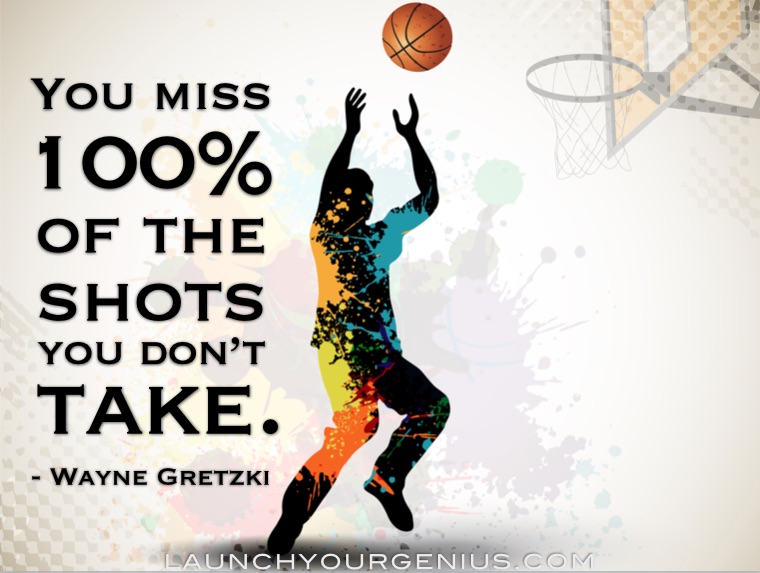

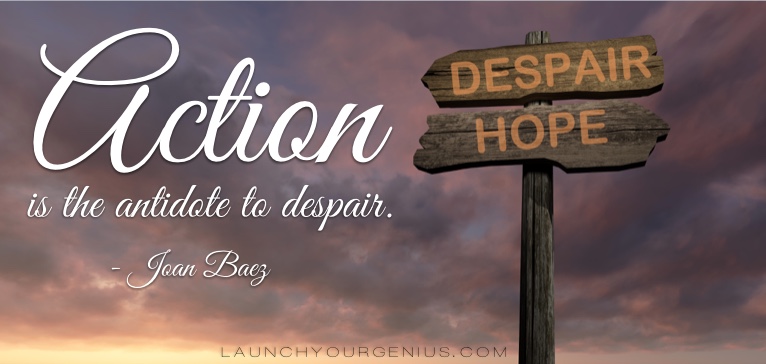


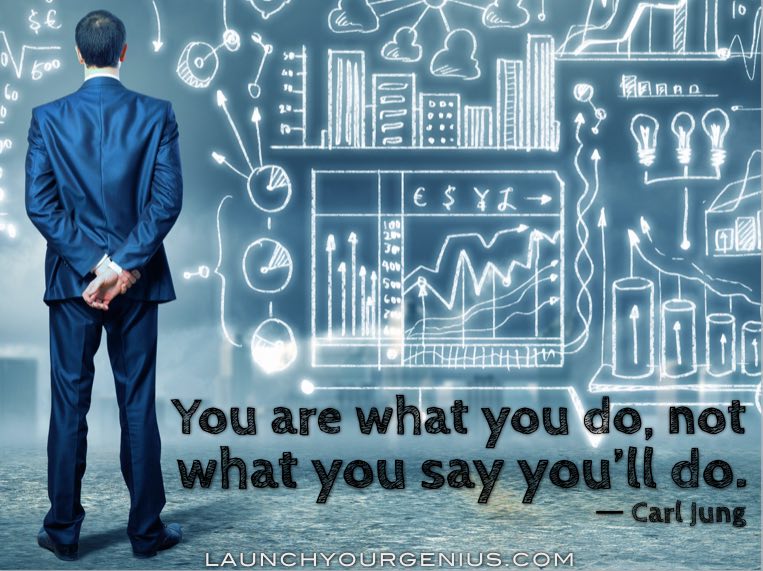
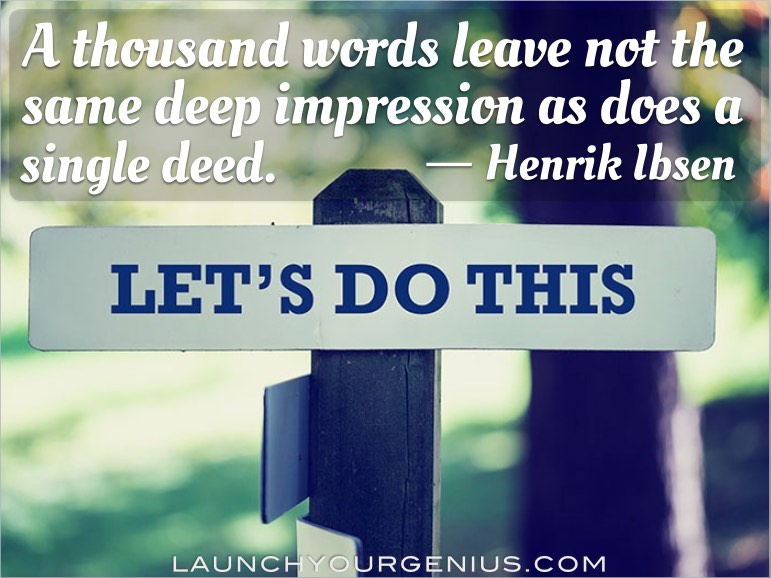
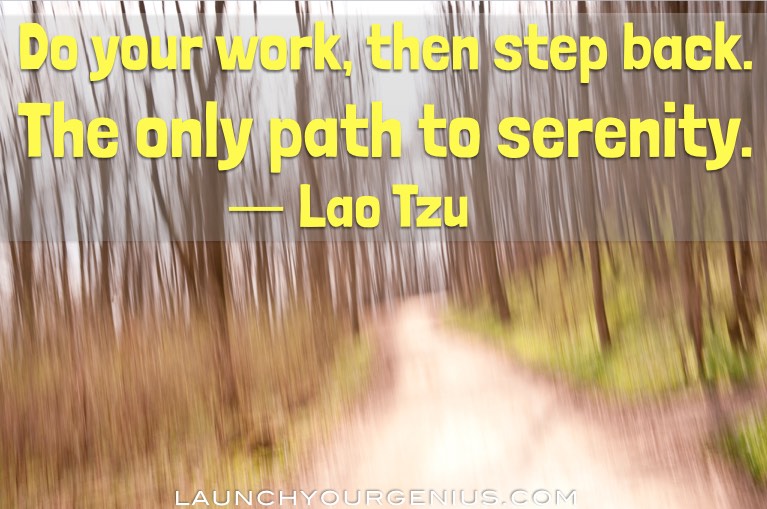

John Countryman says
The ideas are terrific, but please have someone carefully proofread your comments for errors!!!
Harish says
Hello John,
Hope you are having a great holiday season! Thanks for mentioning about proofreading. I did go through the post a couple of times and through some electronic editors and so on. I just went through the entire post again before writing this comment and to be honest did find some errors that I had missed before. I believe that it is a process of continually improving our writing and editing processes as we move along.
Thanks for your kind words on the ideas and sorry if you caught some errors! 🙂 Usually, my attempt is to not have any typos or errors but a few slip in through the cracks at times. But I will take your comment as feedback to make my posts better and better, especially when the posts are this long.
Besides that, what do you think of the following?
1. Ideas and how the main points are being developed?
2. Style of writing?
3. Simplicity of language and understandability of the material?
4. Any further improvements? Such as: The sentences could have more emotion to them and so on…
All input will be highly appreciated!!
5. What else would you like to see on LYG?
6. Do you read very long posts like this from beginning to end or do you only read the highlights?
Thanks for your input. Have an awesome week!
Harish
Vernon says
Hi Harish,
Merry Christmas!
I agree there’s no better way to end the year than with a thought provoking post like this. Personally it’s confirmation for me. I recently had a conversation with my best friend and I explained to him that I will give up on me. When it’s time for me to gert out of my confort zone by taking action that challenge me I will throw in the towel.
The quote you added by Abraham Maslow says it better.
Thanks for adding the video of Pico Lyer what he said made a lot of sense. These days we must rest and be still on purpose to find ourselves.
Fresh ideas are constantly running through my mind but I never gave it a thought to have an action plan to develop them. I can’t really say I rationalize them way as much as I just don’t follow through. Now I’m going to put a plan into action when I get an idea.
Perfectionism is a thorn in my side. It plays a major part in why I don’t follow through on my ideas and plans. You blessed your reader by adding the masks it wears. Not feeling like I’m not good enough is a big one for me but God tells me that’s a lie.
Each year I try to have one word I live by for that year. In 2014 it was focus because I found myself trying to do too much at one time and not getting anything done. Thanks to this post my word for 2015 will be ‘Action!’
Have a Happy New Year!
Harish says
Hi Vernon!
Thanks a lot for your comment and your kind words and hope you had a Merry Christmas!
I totally understand what you mean by giving up on the self because I have done the same thing many times. Sometimes it feels like things are not moving forward at all and that is the time that I feel less encouragement to continue. Also, we have certain expectations of how things ought to work out and when they do not do that, we throw in the towel. I guess the best way for me to continue is to remind myself that things always do not work out as expected and planned and there are multiple ways to the same solution.
I agree that the video by Pico Iyer is immensely useful for this day and age. With all the technology and the current pace of life, silence and stillness are difficult to find and sustain. But having a silence practice is great for the creative process and life in general. It allows me to think my own thoughts more deeply and feel relaxed regardless of the external circumstances.
I agree with you that following through is a big issue. I have had the issue of follow through many times and I have to continually remind myself to stay the course. Because there are so many distractions and projects to complete and different avenues to pursue, it is quite difficult to focus with a great concentration. I like the selection of one word for every year that you come up with. I am also very honored that you are allowing this coming year’s word to be action after getting inspired by this post. I am inspired by your comment and would like to use “focused action” to be my words for 2015!! So thanks to you too!
Thanks again and have a wonderful New Year!
Harish